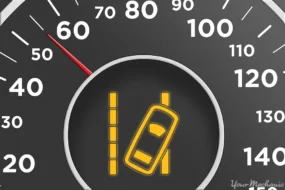Tire Pressure Monitoring Importance of TPMS. In the realm of automotive safety, one often overlooked yet critical component is the Tire Pressure Monitoring System, commonly known as TPMS. This ingenious technology has revolutionized the way we approach tire maintenance, playing a pivotal role in enhancing road safety. In this article, we will explore the significance of TPMS and why every driver should pay heed to their tire pressure.
Safety First: The Foundation of TPMS
The fundamental purpose of Tire Pressure Monitoring is to ensure the safety of drivers and passengers alike. Proper tire pressure is crucial for optimal vehicle performance, stability, and control. Under-inflated tires can lead to increased braking distances, poor handling, and a higher risk of accidents. TPMS continuously monitors tire pressure and alerts the driver when deviations from the recommended pressure occur, acting as a proactive safety measure.
Fuel Efficiency: The Economic Advantage
Beyond safety concerns, TPMS contributes to improved fuel efficiency. According to the U.S. Department of Energy, properly inflated tires can improve gas mileage by up to 3%, saving drivers money at the pump. TPMS helps in maintaining the right tire pressure, preventing unnecessary fuel consumption and reducing the overall carbon footprint of vehicles.
Tire Longevity: A Cost-Effective Approach
Tires are a significant investment for vehicle owners, and proper maintenance is essential to extend their lifespan. TPMS aids in this endeavor by preventing premature tire wear. Under-inflated tires generate excess heat, leading to accelerated tread wear and reducing the overall longevity of the tire. By ensuring optimal tire pressure, TPMS contributes to cost savings for drivers by minimizing the frequency of tire replacements.
Environmental Impact: Going Green with TPMS
In an era where environmental consciousness is paramount, TPMS emerges as a green technology. By promoting proper tire inflation, TPMS helps reduce fuel consumption and, subsequently, vehicle emissions. This not only benefits individual drivers but also contributes to the collective effort in combating air pollution and environmental degradation.
Legal Compliance: Meeting Standards and Regulations
As awareness regarding road safety and environmental concerns grows, governments worldwide are implementing strict standards and regulations. Many countries have mandated the inclusion of TPMS in new vehicles to ensure compliance with safety and emission norms. Drivers who neglect the importance of TPMS may find themselves on the wrong side of the law, facing penalties for non-compliance.
Real-Time Monitoring: The Technological Edge
Modern TPMS goes beyond a simple warning light on the dashboard. Advanced systems provide real-time Blind Spot monitoring, displaying individual tire pressures and temperatures. This not only empowers drivers with more information but also enables them to address issues promptly, preventing potential tire failures and roadside emergencies.
Winter and Summer Driving: Adapting to Conditions
Tire Pressure Monitoring can fluctuate with temperature changes, affecting vehicle performance. TPMS becomes especially crucial during extreme weather conditions, such as winter and summer. Cold temperatures can lead to decreased tire pressure, while hot weather can cause over-inflation. TPMS ensures that drivers are informed and can adjust tire pressure accordingly, optimizing safety and performance in diverse driving conditions.
Conclusion:
In conclusion, Tire Pressure Monitoring have evolved from a luxury feature to a necessity in modern vehicles. The importance of TPMS cannot be overstated, as it addresses safety, fuel efficiency, tire longevity, environmental concerns, legal compliance, and provides a technological edge for drivers. Embracing TPMS is not just a matter of adherence to regulations; it is a conscious decision towards safer roads, lower carbon footprints, and a more sustainable driving experience. As we navigate the roads of the future, let TPMS be our vigilant companion, ensuring that every journey is not only enjoyable but, above all, safe.











